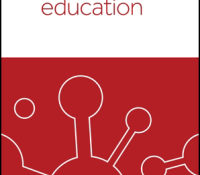eric.ed.gov har udgivet: This paper aims to provide a reflective overview of the curriculum developments in teacher education for Scotland in the Division of Technology, Department of Maths, Science and Technology Education, University of Strathclyde. A course in technology must by its very nature be frequently updated and reviewed if it is to be considered to be pertinent and relevant. This paper aims to gauge the design and technological confidence and developing capability of students. Two cohorts have completed the first two years of the four-year degree course, B.Ed Design and Technology. As the third cohort begins, progress to date is considered. The question is asked: Does the course educate for technological literacy and provide students with the creativity to educate for technological literacy with perspective, sensitivity, creativity, and confidence?… Continue Reading →
Like this:
Like Loading...
tandfonline.com har udgivet en rapport under søgningen “Teacher Education Mathematics”: ABSTRACT Formulae display:?Mathematical formulae have been encoded as MathML and are displayed in this HTML version using MathJax in order to improve their display. Uncheck the box to turn MathJax off. This feature requires Javascript. Click on a formula to zoom. ABSTRACT Keynes thought it would be ‘splendid’ if economists became more like dentists. Disciplinary economics has instead become more like physics in focusing on concise, universal propositions verified through decisive tests. This focus, I argue, limits the practical utility of the discipline because universal propositions form only a part of new policy recipes. I further suggest that, as in engineering and medicine, developing economic recipes requires eclectic combinations of suggestive tests and judgement. Additionally, I offer a detailed example… Continue Reading →
Like this:
Like Loading...

tandfonline.com har udgivet en rapport under søgningen “Teacher Education Mathematics”: Abstract Formulae display:?Mathematical formulae have been encoded as MathML and are displayed in this HTML version using MathJax in order to improve their display. Uncheck the box to turn MathJax off. This feature requires Javascript. Click on a formula to zoom. Abstract The advancements in technological innovations have had a substantial impact on the Internet infrastructure, Web technology, and the usefulness of e-learning systems. This requires a discrete initiative to exploit the full capabilities of technological innovation to improve the functional characteristics of e-learning systems, the ensuing benefits, and to sustain educational challenges. A context-based model that incorporates explicit and widely accepted determinants of information systems success, technology acceptance, e-learning success models, and technological innovation has been developed. Empirically, the… Continue Reading →
Like this:
Like Loading...

tandfonline.com har udgivet en rapport under søgningen “Teacher Education Mathematics”: ABSTRACT ABSTRACT Successful use of ICT in the classroom requires thoughtful integration of technology and pedagogical processes during lesson preparation. This study investigated whether the information format of technological and pedagogical support affects pre-service teachers’ technology integration in lesson plans. One group of pre-service teachers (n = 37) received support materials that presented technological, pedagogical and content information separately; another group (n = 36) received a version of these materials in which the technological and pedagogical information was integrated. Pre-service teachers used these support materials to create a technology-infused lesson plan. As expected, the pre-service teachers who received integrated support had relatively more design justifications in which technology and pedagogy were combined than their peers from the separate support group.… Continue Reading →
Like this:
Like Loading...
eric.ed.gov har udgivet: Technology is an indispensable part of the educational curriculum, and large budgets have been allocated to provide technological infrastructure in secondary education institutions in Turkey. It is important that teachers have the technological pedagogical content knowledge (TPCK) to successfully integrate technology into their courses. The aim of this study is to examine the development of the TPCK of a mathematics teacher who participated in in-service training course organized for the use of Geogebra software in geometry teaching. The in-service training is designed in accordance with the Technology Integration Model stages, and Geogebra software is used taking into account the learning outcomes of 9th and 10th grade secondary school geometry. The case study method has been employed, and data was collected through interviews, observation, self-assessment forms, and field… Continue Reading →
Like this:
Like Loading...
eric.ed.gov har udgivet: This study examines how elementary preservice teachers notice children’s mathematical thinking and how this noticing influences the evaluation of technological resources. In particular, we explore the aspects of thinking to which preservice teachers attend and how they interpret evidence about children’s thinking when using the Spatial-Temporal Math (ST Math) program. Data collection included a group survey administered after an initial exploration of a set of ST Math activities, screencast recordings during which children used and talked about the program, and a reflective writing assignment. The findings of this study show how preservice teachers used their noticing skills (attending and interpreting) in their evaluations of the tool, in some cases prompting them to shift their evaluation on the basis of student thinking. [For the complete proceedings, see ED606556.]… Continue Reading →
Like this:
Like Loading...


